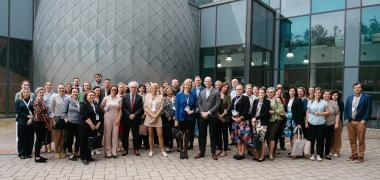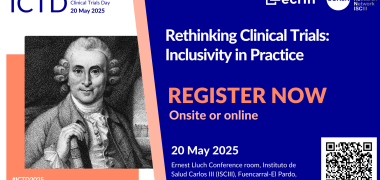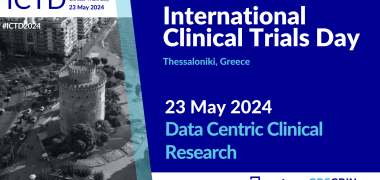ICTD 2025 - Rethinking Clinical Trials: Inclusivity in Practice Recap
ECRIN organised International Clinical Trial Day (ICTD) 2025 alongside our Spanish national partner, SCReN, in Madrid (Spain).
ICTD 2025 was a hybrid event focusing on inclusion in clinical studies, and was held at the Instituto de Salud Carlos III (ISCIII). Onsite, there was a full house of 150 participants and close to four hundred stakeholders from the European and global international clinical research community joined the online broadcast.
The need for greater inclusivity in clinical studies is clear in Europe and there is an increasing obligation to progress. By uniting different stakeholders from the clinical research community, ICTD shed a light on why inclusion should be embraced in clinical research through concrete examples of what has been done so far. This year's conference demonstrated where there are still hurdles to overcome, and more importantly, what is underway to work to resolve these difficulties and how some have overcome them.
The event was particularly notable this year, as we celebrated 20 years of ICTD celebrations, which were originally launched by ECRIN in 2005 as part of the ECRIN Reciprocal Knowledge Programme or ECRIN-RKP (funded by European Union Framework Programme 6, FP6, "Societal challenges” health sub-programme [GA No. 511963]).
Welcome to ICTD 2025
Jacques Demotes - Director General, ECRIN
Marina Pollán Santamaría - General Director, ISCIII
International Clinical Trial Day 2025 was officially opened by Jacques Demotes and Marina Pollán Santamaría. Jacques and Marina thanked participants for joining and reflected on precious places where ICTD has been held.
Setting the Scene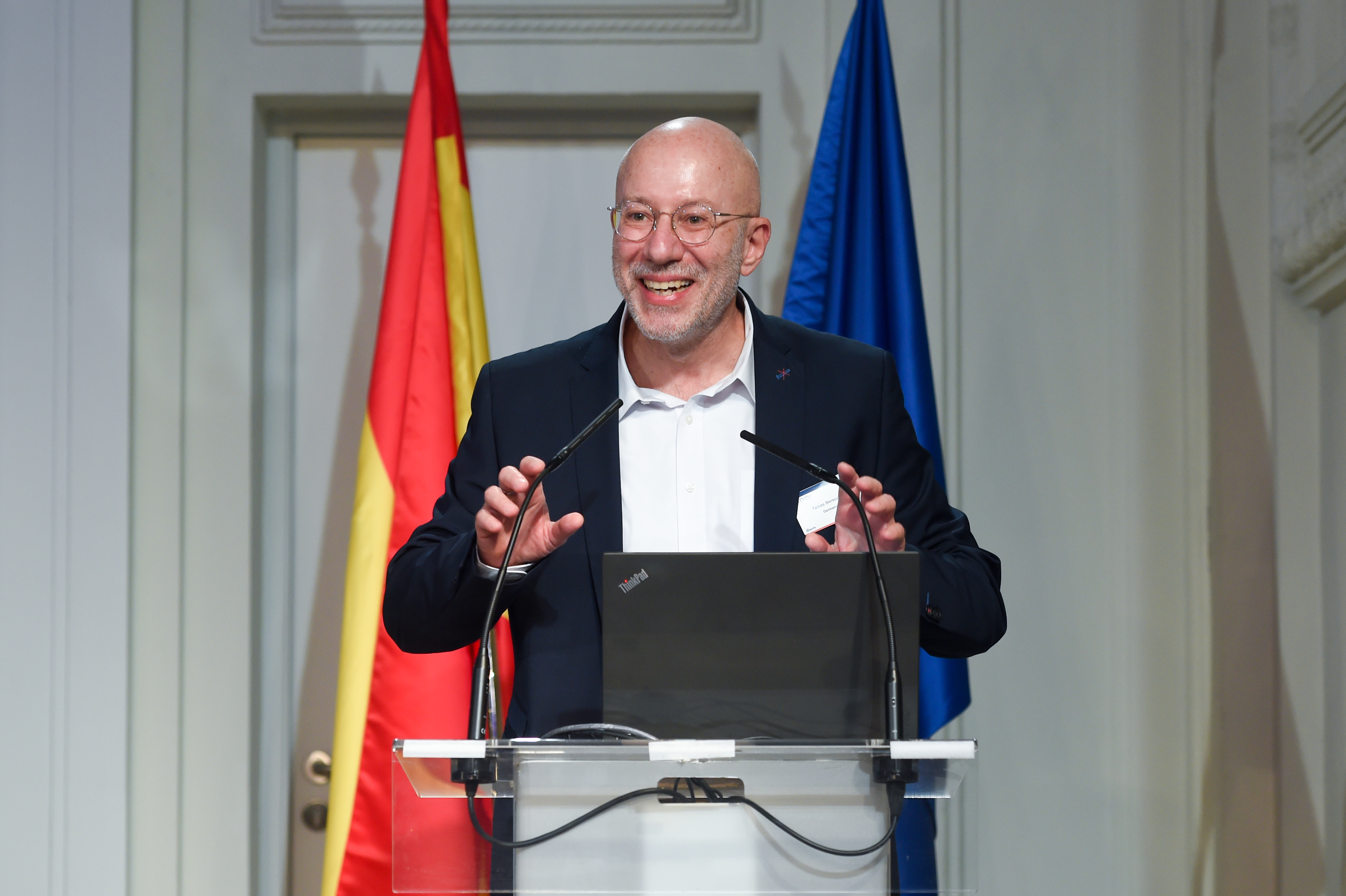
After a welcome by our hosts we had an interactive session with both Tamás Bereczky and Shaun Treweek, to set the scene with the audience and lay the foundations for our understanding of inclusivity and trial design.
What is inclusivity? Defining the key words for a common understanding
Tamás Bereczky PhD, Social Psychologist, Deutsche Aidshilfe e.V., EUPATI
Tamás' expertise allowed the audience to open up their understanding of what diversity looks like, and questioned where our own senses of bias stem from, Tamás asked participants to look at themselves and how they situate themselves within their work, "You come to this table with your own identity elements that influence how you do your work, and how you do science". His in-depth presentation shared how his own experience as an under-represented individual has shaped his research and passion to make inclusion a must have in clinical trials, not just a box to optionally be ticked.
Why inclusion matters in clinical trials
Prof. Shaun Treweek PhD, Professor of Health Services Research, Aberdeen Centre for Evaluation, University of Aberdeen & SENSITISE project consortium member
Shaun continued to set the scene by asking the audience to take a look at trial design, and how it can be a place where inclusivity is not considered. He used Slido to ask the audience about their experience with training and what is lacking, which will inform his work within the SENSITISE project. Shaun continued, "Inclusivity is a design issue. It's about designing a trial or a piece of research that is going to provide the best possible scientific evidence to support improved patient care. That's what inclusion is about. Do we have in our trial, or other piece of health research, a good idea of who the people are who could benefit from this new intervention or treatment." He gave some examples of what his work has tried to achieve and how results haven't necessarily matched the goals from the outset. He summarised by expressing that inclusion matters, "It's important for us to think about inclusion, because inclusion is better science. It means we include all the people who we need to involve in our trial for those results to be applicable to all of those who could potentially benefit from it. We want to improve the health of everybody who our trial is involving."
It's important for us to think about inclusion, because inclusion is better science.
Stakeholder Perspectives (Part 2)
Psychiatric exclusion criteria in clinical research: bridging the ethical and health need divide
Josephine Tapper, EUPATI fellow and patient representative
Up first, Josephine spoke of her experience as a patient and the issues linked to exclusion criteria. Josephine continued to build on why exclusion matters, "one of the issues is not just research design and formal design but it is also discretionary. Often the healthcare professional doing the recruiting can have biases, both overt and unconscious." She went on to speak about issues regarding mental health funding and how it is often not prioritised. She finished by providing examples of things that are being done to increase patient and public involvement.
Ensuring inclusivity in study design: an ethics perspective
Irene García Gacía, MD, PhD, Clinical Pharmacologist, Hospital Universitario La Paz; Associate Professor, Universidad Autónoma de Madrid
Irene gave her perspective on the role ethics committees could play when promoting inclusivity in clinical studies, and how it is a core responsibility. She discussed why it is challenging to identify when and how clinical research has been designed to ensure an inclusive approach and how this raises a key question around who is responsible for ensuring that the study design is inclusive. She outlined what role ethics committees play within research and highlighted that it is their role to take into account the view of laypersons, in particular patient or patient organisations, to ensure that trials are conducted in line with ethical principles, "ethics committees are not only empowered, but they are actively encouraged under European guidance to promote equity, fairness and inclusion in research design."
Panel: Engaging with the underserved populations, what works? 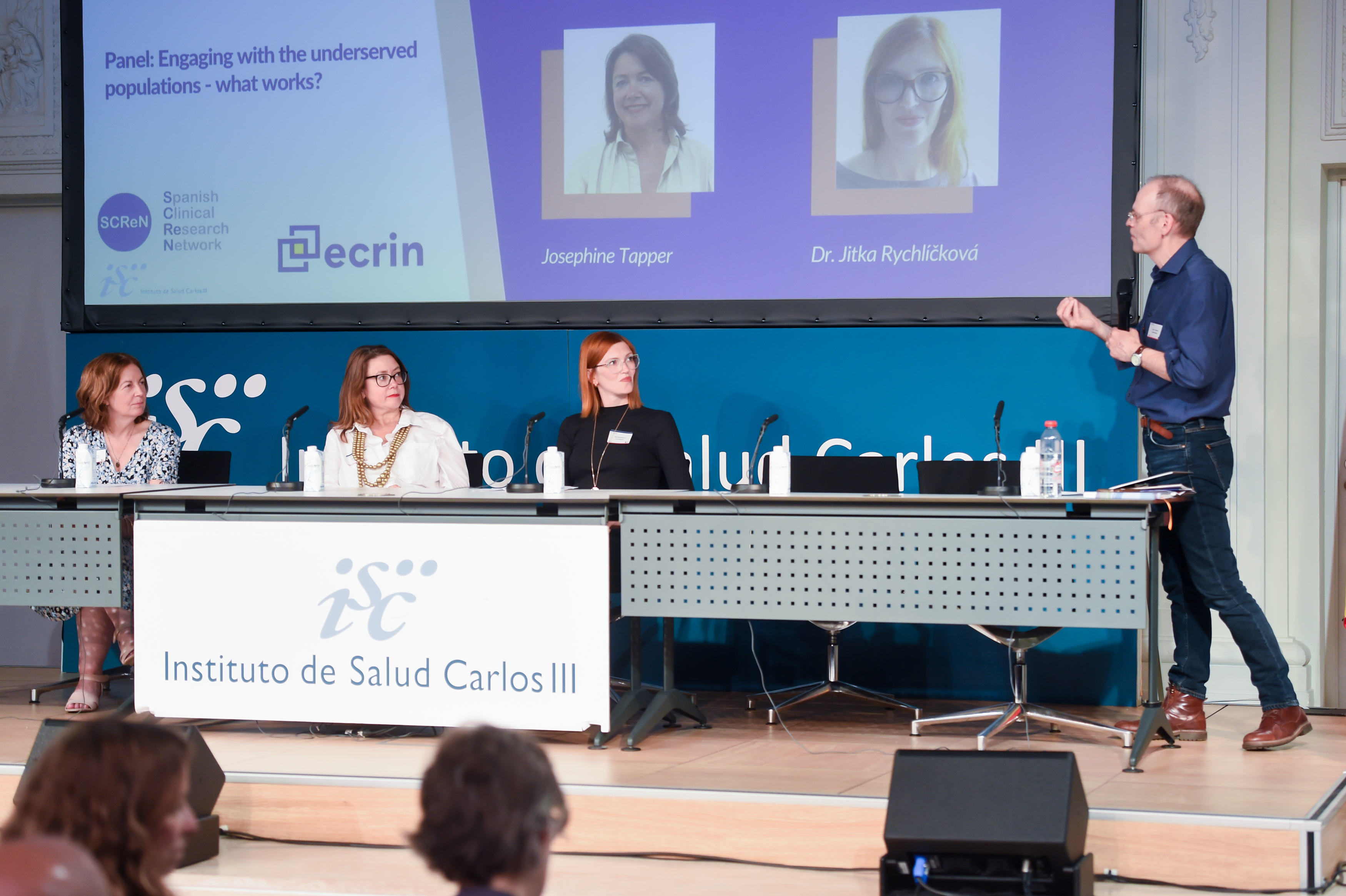
Moderated by Prof. Shaun Treweek PhD, Professor of Health Services Research, Aberdeen Centre for Evaluation, University of Aberdeen & SENSITISE project consortium member
Josephine Tapper, EUPATI fellow and patient representative
Dr. Pamela Dicks, Network Manager and PPI Lead at NHS Scottish Children’s Research Network
Dr. Jitka Rychlíčková, Clinical Pharmacologist & Assistant Professor, Masaryk University
In our first panel, moderated by Shaun, Josephine, Pamela and Jitka discussed what works when engaging with underserved populations. This session deepened our understanding of what is important for those with mental health issues as well as how to address the paediatric community. It brought some concrete ideas on what has been tried and tested and ways in which we can progress. Pamela emphasised the importance of retention, "We have to make sure that if we work with families from the very beginning, in those patient/public engagement pathways, are they the families who are going to be represented in clinical trials? Because, like ethics committees, PPI is full of middle-class, professional people and they're not necessarily representing the parents who are then going to bring in their children to clinical trials. […] It's about making sure everyone who is eligible can stay in that trial."
PPI is full of middle-class, professional people and they're not necessarily representing the parents who are then going to bring in their children to clinical trials.
Stakeholder Perspectives (Part 2)
The second set of stakeholder perspective sessions began as Laura Pioppo explained how, as a regulator European Medicines Agency, and ACT EU will work to support inclusivity in the future. Bruno Jolain was then given the floor and shared his five guiding principles for advancing inclusive research at Roche.
How can regulators influence inclusivity in clinical research?
Laura Pioppo, ACT EU Programme Manager, European Medicines Agency
Laura outlined the difference between directive and regulation when defining the conduct of clinical trials regulation. From 2004-2022, we had the clinical trial directive and then in 2024 there was a big shift in the requirements in the Regulation that is now directly applicable to all EMA Member States. This new Clinical Trials Regulation (CTR) is in place to "protect the rights, safety, dignity and well-bring of trial participants." Laura continued by explaining the ACT EU workplan for 2025-26, which will work with ACT EU's regulatory partners to address the main issues around the CTR implementation. She then addressed challenges faced regarding inclusivity and representativeness, including examples such as regional disparities within EU clinical trials, and finished by also sharing opportunities for greater inclusion going forward.
What is the pharmaceutical industry doing to make trials more inclusive?
Bruno Jolain, Portfolio and Strategy Lead Health Equity and Population Science,
F.Hoffmann-La Roche Ltd
Bruno began his discussion by outlining what health equity and population science look like internally at Roche. He explained that the cells used in the lab can open a door to potential discovery and innovation; how early development impacts full development. He shared that historically, we have all faced the same issue of having limited genomic data which has led to limited representation within clinical research. Inclusive research is an emerging global priority, with the common goal of ensuring approved medicines adequately reflect the demographic representation of patients for whom the medical products were intended. His work included sharing a framework of 5 principles (5Ps) to guide the team's effort to Advance Inclusive Research (AIR), which covered the Who (population science); Where (Country & Site Selection to reach representative patient cohorts); What (End-to-End Inclusive Trial Design); Who (Patient Reported Data) and How (Maximise Patient Access to Trials).
We have the opportunity and the duty to integrate this concept of diversity in patient representation end-to-end, and some of this can start in the lab.
Inclusivity in practice
We then zoomed in on concrete examples from academia and industry on how one can address communities that may otherwise be excluded from clinical research: Fidelma Dunne shared her work on developing protocols for pregnant women, GSK's Raquel Gabarro Carrión highlighted regional difference and the impact of ethnicity on dose recommendations and Laura Forcano shared lessons learned from her work in dementia and how building an accessible and respectful consent process can support inclusion of populations with intellectual disabilities.
The importance of clinical trials in pregnancy
Prof. Fidelma Dunne MD PhD MRIA, Director of CTN Diabetes, Director of the Institute for Clinical Trials at the University of Galway
Fidelma provided a clinicians perspective of the importance of clinical trials within pregnancy. When she began her work 30 years ago in the sector, she was told that pregnant women were vulnerable and not to include them in clinical trials because they did not want to contribute. It's poignant that now, they still remain an under-represented population within clinical trials, due to challenges around ethics. Throughout her career, Fidelma has gathered observational data until it came to diabetes, which is one of the most common clinical conditions encountered in pregnancy. Fidelma elaborated: "Participation in trials allows pregnant women with diabetes to access new medications and technologies earlier." She went on to further emphasise the importance of inclusion and how "together, the principles [of EDI] offer a systemic approach to improving clinical trial design and conduct." Her research demonstrated that it is indeed possible to fulfil EDI in trials through careful planning and review throughout and by including it as a priority from the outset.
Striving for scientifically representative trials
Dr. Raquel Gabarro PhD MBA, Global Clinical Development Associate Director at Glaxo Smith Kline (GSK)
Raquel began her piece by highlighting that "diseases and medicine can affect people differently depending on their ethnicity, sex, race and age, so we need to make sure that our clinical trials include those affected by the disease under study." She introduced personalised medicine as an approach when looking to achieve representative trials. She shared some of GSK's approach, findings and next steps, which included the integration of epidemiologic data in their clinical trials, leading to more balance, diverse and representative results. Concrete examples were used to support the research presented by Raquel.
From access to empowerment: inclusive practices in clinical trials
Dr. Laura Forcano PhD, Clinical Psychologist and Scientific Manager Hospital del Mar Research Institute, Barcelona
Laura's presentation used real-world examples to demonstrate how to move from access to empowerment within clinical trials. She presented two cases, which represented different angles of inclusion. The first was a project designed with inclusion at the core which aimed to target people from low socio-economic backgrounds, the second case provided some examples of activities involving people with intellectual disabilities. She explained the importance of "inclusion in clinical trials not just being about expanding eligibility criteria." When beginning a new study, she explained, it is essential to "rethink how we engage, communicate and design studies around people's real needs." Her findings showed the learnings from mistakes the team made and that inclusion is not just a box to be ticked, it's a mindset.
Inclusion in clinical trials is not just about expanding eligibility criteria.
![]() Watch the questions for Fidelma, Raquel and Laura on replay
Watch the questions for Fidelma, Raquel and Laura on replay
Panel: Building a clinical trials environment to support inclusivity 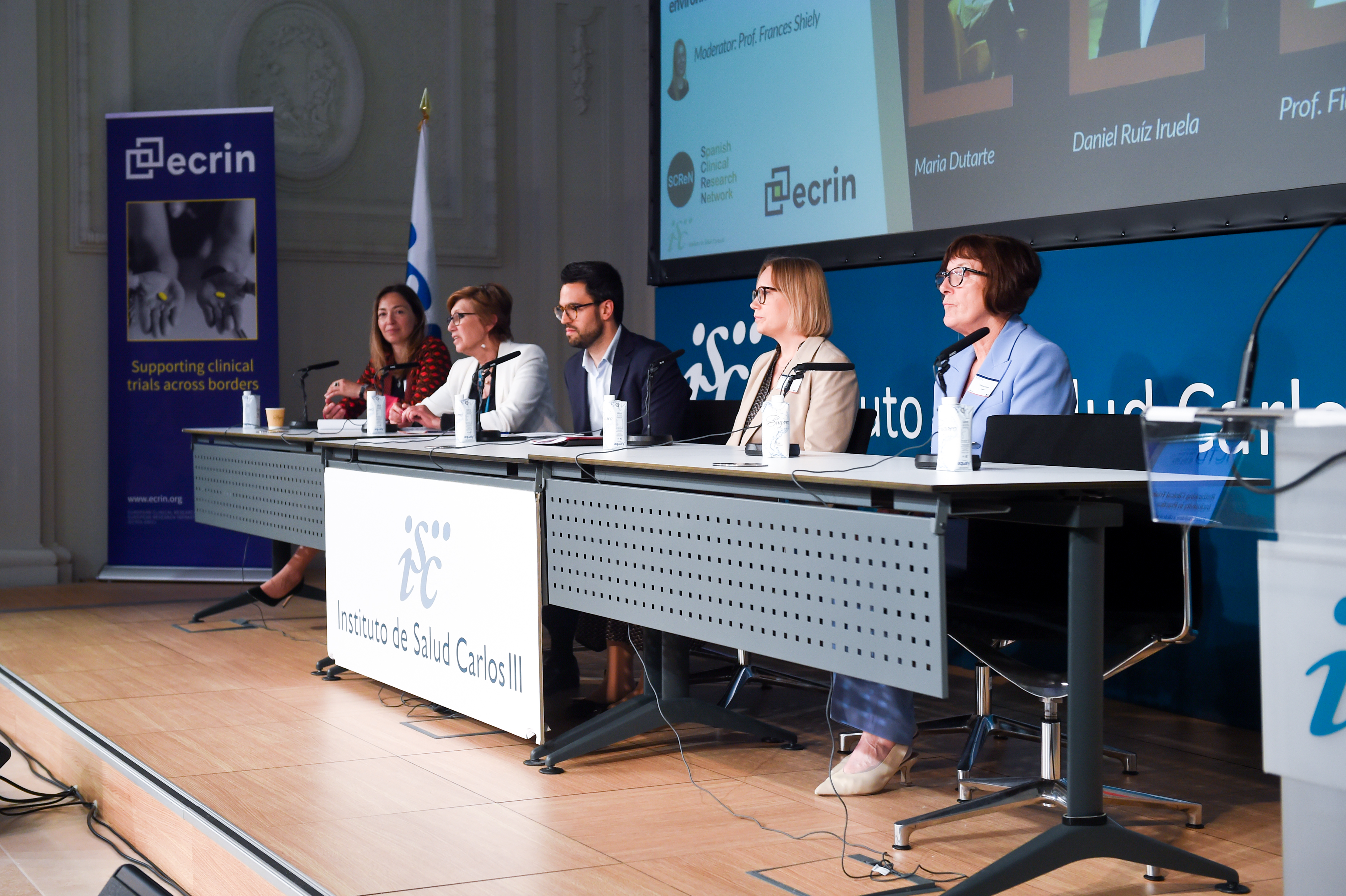
Moderator: Frances Shiely, PhD, Professor of Clinical Trials; HRB Clinical Research Facility and School of Public Health, University College Cork & SENSITISE project coordinator
Prof. Rosario Perona Abellón, ISCIII Deputy Director of Cell therapy & Daniel Ruíz Iruela, ISCIII Deputy Director General for International Research Programs and Institutional Relations
Laura Pioppo, ACT EU Programme Manager, European Medicines Agency
Prof. Fidelma Dunne MD PhD MRIA, Director of CTN Diabetes, Director of the Institute for Clinical Trials at the University of Galway
Maria Dutarte, Executive Director of the European Patients’ Academy on Therapeutic Innovation (EUPATI)
To summarise some of the key elements that exist and are being built, a panel, moderated by Frances Shiely examined how to build a clinical trials environment to support inclusivity. With representatives of the Spanish funder, Rosario Perona and Daniel Ruiz Iruela, who discussed what is done, not only to support the existing clinical trials network, but also to encourage PIs to participate in international calls that reinforce inclusive design. Laura Pioppo then discussed how inclusive design can bring added value to Europe as a clinical trial hub. Fidelma Dunne spoke on how to support investigators to lead more inclusive trials. Maria Dutarte highlighted that inclusivity is now: "the train of inclusivity has left the station and it is full of wonderful passengers".
The train of inclusivity has left the station and it is full of wonderful passengers.
Inclusivity in practice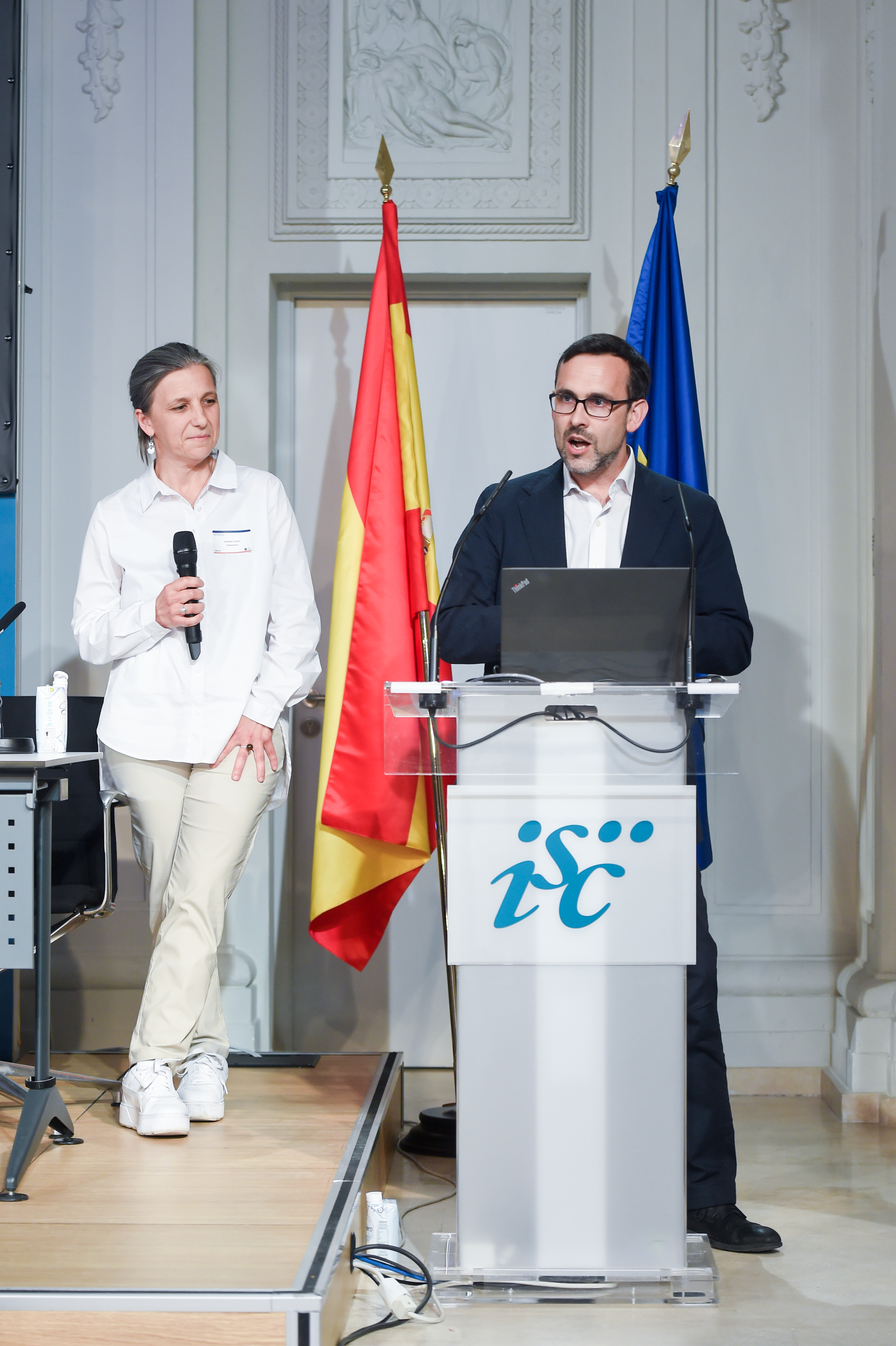
Working towards new solutions: READI project sets the precedent
Juliette Guillot PharmD, Development ESG Lead, Novartis and IHI READI Project Lead
Dr. Alberto M Borobia MD PhD, Head of the Spanish Clinical Research Network (SCReN), Scientific Deputy Director of IdiPAZ and IHI READI Coordinator
To close the day, the principal investigators of the IHI READI, Alberto and Juliette, highlighted a platform that is currently being developed for new solutions that will better improve representativeness in trials. Alberto highlighted the project's aim: "Without representative participation, clinical studies do not reflect real-world populations, limiting the impact of medical innovation." The mission of the project is to reshape the clinical research ecosystem in Europe, allowing everyone to benefit. Juliette further echoed this by sharing that "READI is designed to transform the clinical research eco-system and capabilities, with patients at the centre, and key stakeholders working together for more inclusive clinical studies in Europe."
![]() Watch Alberto and Juliette on replay
Watch Alberto and Juliette on replay
Closing remarks
Jacques Demotes - Director General, ECRIN
ICTD 2025 was officially closed by ECRIN's Director General, Jacques Demotes. He wrapped up the meeting, covering some of the key information provided by the speakers and sharing key questions that remain to be answered. A special thank you goes out to the speakers, the audience, this year’s host country Spain, the ECRIN national partners, and of course all involved in organising this wonderful event. Also, he officially announced that next year ICTD will take place in Prague, in the Czech Republic. We look forward to seeing you there!
![]() Watch Jacques' closing remarks on replay
Watch Jacques' closing remarks on replay



